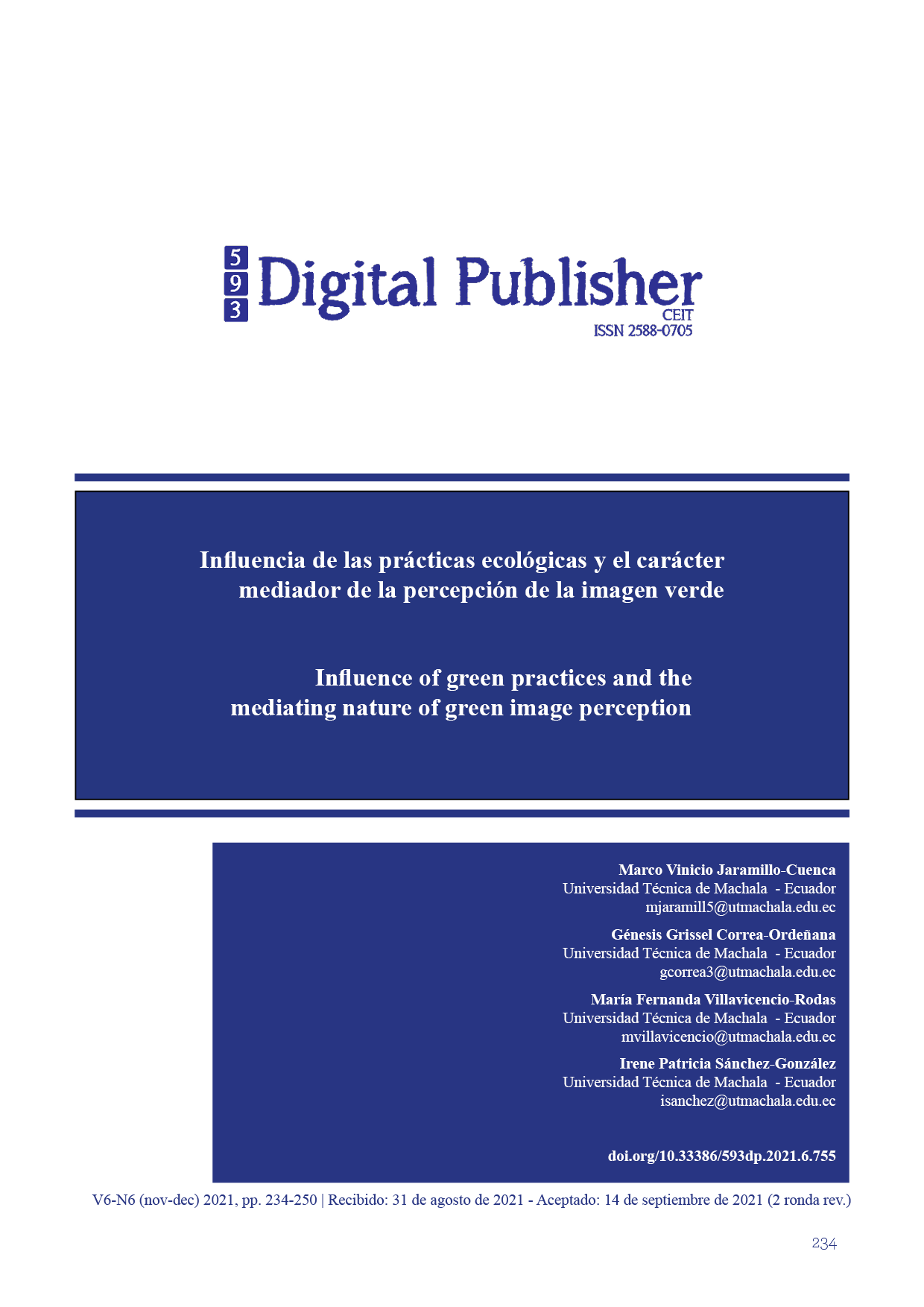Influence of green practices and the mediating nature of green image perception
Main Article Content
Abstract
How important are green practices for retail customers today? Are they enough to be able to generate decisive ecological images in the minds of individuals, and in turn generate changes in attitudes towards hypermarkets? The main objective of this work is to analyze whether the perceived ecological practices influence the idealization of a green image in the mind of the customer and in turn modify the attitudes towards the hypermarkets considered in this study. All this through the analysis of the relationships between the constructs: perceived ecological practices, perception of green image and attitudes towards hypermarkets, based on the application of an exploratory and confirmatory methodology with a sample of 384 clients from the two main hypermarkets positioned in the equator. The results confirmed the acceptance of the hypotheses put forward in the study, demonstrating that perceptions of green practices generate positive attitudes towards the hypermarket. In addition, the perception of the green image acts as a mediating variable in this relationship. Based on this work, further research can be conducted in other provinces, where the retail sector is a dynamic sector of the Ecuadorian economy, to study consumer behavior, not only in the local context, and which can serve as a basis for green marketing and sustainable development projects at the national level.
Downloads
Article Details

This work is licensed under a Creative Commons Attribution-NonCommercial-ShareAlike 4.0 International License.
1. Derechos de autor
Las obras que se publican en 593 Digital Publisher CEIT están sujetas a los siguientes términos:
1.1. 593 Digital Publisher CEIT, conserva los derechos patrimoniales (copyright) de las obras publicadas, favorece y permite la reutilización de las mismas bajo la licencia Licencia Creative Commons 4.0 de Reconocimiento-NoComercial-CompartirIgual 4.0, por lo cual se pueden copiar, usar, difundir, transmitir y exponer públicamente, siempre que:
1.1.a. Se cite la autoría y fuente original de su publicación (revista, editorial, URL).
1.1.b. No se usen para fines comerciales u onerosos.
1.1.c. Se mencione la existencia y especificaciones de esta licencia de uso.
References
Aaker, D. A. (1991). Manage Brand Equity. Free Press.
AENOR. (16 de Mayo de 2021). AENOR. Obtenido de Aenor Confia: https://www.aenor.com/certificacion/medio-ambiente
Ajzen, I. (1991). The theory of planned behavior. Organizational Behavior and Human Decision Processes, 50,179-211.
Ang, M., Ramayah, T., & Amin, H. (2015). Efficacy of the theory of planned behavior in the context of hiring Malaysians with disabilities. Journal of Developing Areas, 49(3) 13-25.
Assael, H. (1984). Consumer behavor and marketing action. Kent Publishing.
Assaker, G., O´Connor, P., & El-Haddad, R. (2020). Examinar un modelo integrado de imagen ecológica, calidad percibida, satisfacción, confianza y lealtad en hoteles de lujo. Revista de marketing y gestión hotelera.
Azebedo, S. G., Carvalho, E., & Cruz Machado, V. (2011). La influencia de las prácticas ecológicas en el desempeño de la cadena de suministro: un enfoque de estudio de caso. El Sevier, 850-871.
Bennett, R., & Rundle-Thiele, S. (2002). Una comparación de los enfoques de medición de la lealtad actitudinal. Journal of brand management, 9(3). 193-209.
Birgelen, M., Semeijn, J., & Keicher, M. (2009). Packaging and pro-enviromental consumption behaviour: investigating purchase and disposal decision for drinks. Enviromental Behaviour, 41 (1), 125-146.
Braga Junior, S., & Rizzo, M. R. (2010). Sustentabilidade através do aproveitamento de resíduos: Um estudo dos processos implantados por um supermercado de médio porte. Revista Brasileira de Engenharia de Biossistemas, 4(2), 108-125.
Cankaya, S. Y., & Sezen, B. (2019). Efectos de las prácticas de gestión de la cadena de suministro verde en el desempeño de la sostenibilidad. Revista de gestión de tecnología de fabricación, 98-121.
Castro, G. M., Amores, J., & Navas, J. E. (2016). Sistemas de gestión ambiental y dempeño de la emprea. Corporate Social Responsibility and Environment Management, 243-256.
Chang, C. (2011). Feeling ambivalent about going gree. J. Advert, 19-32.
Chen, Y. S. (2010). The drivers of green brand equity: Green brand image, green satisfaction and green trust. J. Bus. Ethics, 307-319.
Cheng, M., & Thung, P. (2014). Developing an extended Theory of Planned Behaviour model to predict consumer’s intention to visit green hotels. Int. J. Hosp. Mang, 36, 221-230.
Cheng, Y. S., & Chang, C. H. (2013). Lavado verde y confianza verde; The mediation effects of green costumer confusion and green perceveid risk. Journal of Business Ethics, 489-500.
Coba Molina, E., Diaz Córdova, J., Zurita Meza, E., & Proaño López, P. (2017). La responsabilidad social empresarial en las empresas del Ecuador. Un test de relación con la imagen corporativa y desempeño financiero. Redalyc, 23-44.
Dean, M., Raats, M. M., & Shepherd, R. (2012). El papel de la autoidentidad, el comportamiento anteior y interacción en la predicción de la intención de compra de alimentos frescos y procesados. J. Appl. Soc. Psychol, 42 (3), 669-688.
Dias Junqueira, K., & Braga Junior, S. (2015). The use of reverse logistics for waste management in a Brazilian grocery retailer. Waste Management & Research, 34(1). 22-29.
Ebru, T., İnci, D., Alev, K., & Tuğrul, A. (2015). Green purchase intention of young Turkish consumers: Effects of consumer’s guilt, self-monitoring and perceived consumer effectiveness. Procedia Social and Behavioral Sciences, 207. 147-158.
Ekos Negocios. (2019). Obtenido de Ekos Negocios: https://www.ekosnegocios.com/sector/supermercados
Esparon, M., Gyuris, E., & Estoeckl, N. (2014). ¿Ofrece la certificación ECO beneficios? Journal of Sustainable Tourism, 148-169.
Fayos-Gardó, T., Moliner-Velázquez., B., & Ruíz Molina, M. E. (2015). ¿Es posible aumentar la satisfacción del cliente después de una queja?: La Paradoja de Recuperación del Servicio en el comercio minorista. Universia Business Review, 246. 54-69.
Firmansyah, A., Ariyasa, R., & Arfiansyah, Z. (2021). LA CADENA DE SUMINISTRO VERDE Y EL DESEMPEÑO DE SOSTENIBILIDAD EN PAÍS EMERGENTE. Journal of Governance and Regulation, 139-152.
Fornell, C., & Larcker, D. (1981). Evaluating structural equation models with unobservable variables and measurement error. Journal of Marketing Research, 18(1), 39-50.
García Lombardía, P. (2017). ‘Greenwashing’ ser o no ser verde. Harvard Deusto Marketing y Ventas, 141. 30-35.
Gonzaléz Ordóñez, A. I. (2018). Las certificaciones ambientales ecuatorianas en la competitividad de las empresas. Innova Research Journal, 55-67.
Ha, H., & Janda, S. (2012). Predicción de las intenciones de los consumidores de comprar energía eficeinte de energia. J. Consum. Mark, 29 (7), 461-469.
Hair, J., Hult, G., Ringle, C., & Sarstedt, M. (2016). A primer on partial least squares structural equiation modeling (PLS-SEM). Los Ángeles: Sage Publications.
Han, H., & Yoon, H. J. (2015). Hotel customers’ environmentally responsible behavioral intention: Impact of key constructs on decision in green consumerism. International Journal of Hospitality Management, 45. 22-33.
Han, H., Chen, C., Heejung Lho, L., Kim, H., & Yu, J. (2020). Hoteles ecológicos: exploración de los impulsores de los comportamientos de enfoque del cliente para el consumo ecológico. Sustainability.
Han, H., Hsu, L. T., & Sheu, C. (2010). Aplicación de la teoría del comportamiento planificadoa la green hotel choice: testing the effect on enviromental friendly activities. Tour Manag, 31, 325-334.
Hwang, J., & Lyu, S. (2019). Relaciones entre la imagen ecológica, las actitudes del consumidor, el deseo y el comportamiento de ciudadanía del cliente en la industria de las aerolíneas. Taylor and Francis Online, 437-447.
INEC. (2021). Encuesta nacional de empleo, desempleo y subempleo. Gobierno Nacional.
Jebarajakirthy, C. L., & Antonio, C. (2014). Los jóvenes afectados por la guerra como consumidores de microcréditos: una aplicación y extensión de la teoría del comportamiento planificado. J. Retail Consum. Serv., 21, 239-248.
Jeong, E., & Jan, S. (2010). Effects of restaurant green practices: Which practices are important and effective? Caesars Hospitality Research Summit, 13, 1-23.
Jeong, E., & Jang, S. (2010). Effects of restaurant green practices: Which practices are important and effective?. Caesars Hospitality Research Summit, 13. 1-23.
Jeong, E., Jang, S., Day, J., & Ha, S. (2014). The impact of eco-friendly practices on green image and customer attitudes: An investigation in a café setting. International Journal of Hospitality Management, 41. 10-20.
Joshi, Y., & Rahman, Z. (2016). Predictors of young consumer’s green purchase behaviour. . Management of Environmental Quality, 27(4), 452-472.
Justin, P., Ashwin, M., & Jayesh, P. (2015). Predicción de productos ecológicos mediante la teoría de comportamiento y acción razonada. El Sevier, 123-137.
Kilbourne, W., & Pickett, G. (2008). How materialism affects environmental beliefs, concern, and environmentally responsible behavior. Journal of Business Research , 61(9), 885-893.
Kotler, P., Haider, D., & Rein, I. (1993). Lugares de marketing: atraer inversiones, industria y turismo a ciudades, estados y naciones. The Free Press.
Krishna, A., & Uday, R. (2009). Spillover Effects of Cause-Related Products in a Product Portfolio. Management Science, 55(9), 1496-1485.
Kumar, P. (2014). La ecologización del comercio minorista: una experiencia india. Revista Internacional de comercio minorista y gestion de distribución , 42(7). 613-625.
LeBlanc, G., & Nguyen, N. (1996). Cuestiones utilizadas por los clientes para evaluar la imagen corporativa en las empresas de servicios: un estudio empírico en las instituciones financieras. Corporate Communications, 1(2). 30-57.
Lee, J.-S., Hsu, J., Han, H., & Kim, Y. (2010). Comprender cómo los consumidores ven los hoteles ecológicos: cómo la imagen ecológica de un hotel puede influir en las intenciones de comportamiento. Taylor and Francis Online, 901-914.
Lewandowska, A., Witczak, J., & Kurczewski, P. (2017). Green marketing today - a mix of trust, consumer par ticipation and life cycle thinking. Management, 21(2), 28-48.
Lim, T., Chye, F., Sulaiman, M., Suki, N., & Lee, J. (2016). A structural modeling on food safety knowledge, attitude, and behaviour among Bum Bum Island community of Semporna, Sabah. Food Control, 60, 241-246.
MAE. (2018). Ministerio de Ambiente Ecuador. Obtenido de (Ministerio del Ambiente del Ecuador). 2018. Recuperado de: http://www.ambiente.gob.ec/puntoverde/ http://www.ambiente.gob.ec/mae-presento-oficialmente-el-reconocimiento-ecuatorianoambiental-carbono-neutral/
Manaktola, K., & Jauhari, V. (2007). Exploring consumer attitude and behaviour towards green practices in the lodging industry in India. Int. J. Contemp. Hospital. Manage, 364-377.
Martinez, P., Herrero, A., & Gómez, R. (2018). Respuestas de los clientes a los hoteles con certificación medioambiental; el efecto moderador en la formación de intenciones de comportamiento. Revista de turismo sostenible.
MIles, M. P., & Covin, J. G. (2000). El marketing medioambiental: una fuente de reputación, ventaja competitiva y financiera. Revista Ética Empresarial, 299-311.
Mostafa, F. F. (2007). A Hierarchical Analysis of the Green Consciousness of Egipt Consumer. Psychol Mark, 24 (5), 445-473.
Namkung, Y., & Shawn, S. (2012). Efectos de las prácticas ecológicas de los restaurantes en la formación de valor de marca:¿realmente importan las prácticas ecológicas? El Sevier, 85-95.
Netemeyer, R., & Bearden, W. (1992). Un analisis comparativo de dos modelos de intención conductal. Acad.Mark.Sci, 20(1), 49-59.
Norazah, M. S. (2013). Green products purchases: Structural relationships of consumers’ perception of eco-label, eco-brand and environmental advertisement. Journal of Sustainability Science and Management, 8(1), 1-10.
Paez Pérez, P., Ehmig, H. W., Borja, J., & Reyes, J. (2016). Superintencia de Control del Poder de Mercado. Obtenido de http://www.scpm.gob.ec
Patel, R. (2016). Green Marketing: As Tool for Sustainable Development. Journal of Business and Management, 18(8), 139-142.
Polonski, M. J. (1994). Regulación del marketing ecológico en Estados Unidos y Australia; la lista de control australiana, Greener Management International. Greener Management International, 44-53.
Quintero Arango, L. F. (2015). EL SECTOR RETAIL, LOS PUNTOS DE VENTA Y EL COMPORTAMIENTO DE COMPRA DE LOS CONSUMIDORES DE LA BASEDE LA PIRÁMIDE EN LA COMUNA 10 DE LA CIUDAD DE MEDELLÍN. Revista Ciencias Estratégicas, 23(33). 109-118.
Rajeev, K. (2016). Green marketing: The next big thing. Advances in Management, 9(2), 1-4.
Revista Líderes. (2014). Revista Líderes . Obtenido de Líderes: https://www.revistalideres.ec/lideres/tendencia-aplicar-estrategias-ecologicas.html
Revista Lideres. (12 de Octubre de 2016). Ahora las compras son más planificadas. Revista Líderes. Recuperado el 13 de Junio de 2021, de https://www.revistalideres.ec/
Salgado, L., Subirá, M., & Beltrán, L. (2009). Consumo orgánico y conciencia ambiental de los consumidores. Problemas del desarrollo, (40(157), 189-199.
Sánchez González, I., Gil Saura, I., & Ruíz Molina, M. E. (2020). Efectos del desarrollo sostenible percibido por el consumidor. Una propuesta de modelo de hipermercados en Ecuador . Journal of Management and Economics for Iberoamerica, 36(154). 27-42.
Schwaiger, M. (2004). . Componentes y parámetros de la reputación corporativa: un estudio empírico. Schmalenbach Business Review, 46-71.
Sorescu, A., Frambach, R., Singh, J., Rangaswamy, A., & Bridges, C. (2011). Innovations in Retail Business Models. Journal of retailing, 87. S3-S16.
Sum, V. (2012). Most Ethical Companies and Stock Performance: Empirical Evidence . International Research Journal of Applied Finance, 3(8). 1286-1292.
Vachon, S. (2007). Prácticas verdes de la cadena de suministro y selección de tecnologías ambientales. Revista Internacional de Investigación de Producción, 4357-4379.
Wang, W., Krishna, A., & McFerran, B. (2017). Turning Off the Lights: Consumers’ Environmental Efforts Depend on Visible Efforts of Firms. Journal of Marketing Research, 54(3), 478-494.
Wang, W., Krishna, A., & McFrerran, B. (2017). Turning Off the Lights: Consumers’ Environmental Efforts Depend on Visible Efforts of Firms. Journal of Marketing Research, (54)3. 478-494.
Yadav, R., & Pathak, G. (2017). Determinants of consumers’ green purchase behavior in a developing nation: Applying and extending the theory of planned behavior. Ecological Economics, 134, 114-122.
Zhao, X., Lynch, J. G., & Qimei, C. (2010). Reconsidering Baron and Kenny: Myths and Truths about Mediation Analysis. Journal Of Consumer Research, (37)2, 197-206.





